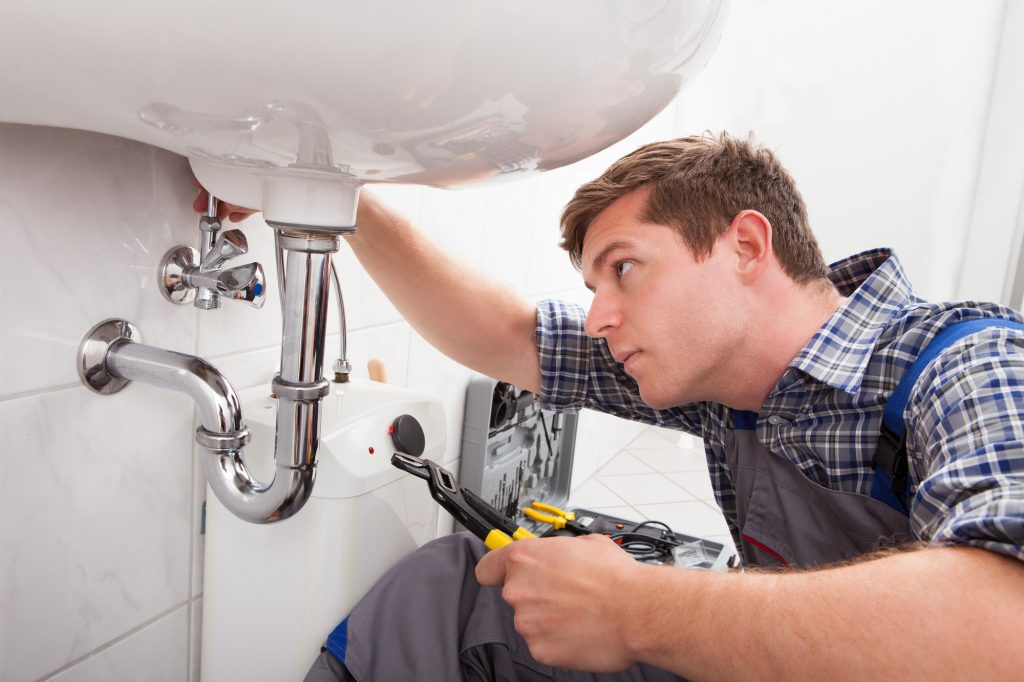9 Signs for When to Call a Plumber
What looks like an easy DIY plumbing fix is all fun and games until it turns into a costly nightmare. The average homeowner may know their way around a plunger and drain cleaner, but that’s not enough to tackle most plumbing issues.
Repairs and water damage will hit your wallet hard. That’s why knowing when to call a plumber will save you valuable time and money.
But how do you know when to give in and make that call? What are the warning signs that you may be getting in over your head?
Help is here. Put down that wrench and watch for these 9 telltale signs.
1. Low Water Pressure
If you find your water pressure is lower than normal, first make sure it’s not something simple causing it.
Look for gunk buildup around your showerhead or faucet aerator. The gunk can restrict the flow of water, making it seem like you have a pressure issue when you really don’t.
If this is the case, it’s an easy fix. All you have to do is clean your showerhead or unscrew the faucet aerator and clean the gunk out.
But if your pressure isn’t restored to normal after that, it could indicate something serious is going on. Like a broken pipe, water leak, or eroded waterline. That’s when you need to call in the professionals immediately.
2. Hearing Running Water
It’s normal to hear running water through the pipes when you’re using the dishwasher or after someone has flushed the toilet. It’s not normal, however, to hear running water when the water isn’t in use at all.
If this is happening, you could have an active leak. Walk around your house and see if you can find any wet spots in the ceiling, on the walls, or puddles of water on the floor.
If you’re able to pinpoint the location, this will help cut down the amount of time it takes for a plumber to find the source.
And if it’s your toilet that continuously runs, it could be as simple as a flapper going bad. That is easy to fix on your own. But if it’s accompanied by a hissing or a whistle, another component of the toilet is going out and you need help from a plumber.
3. Slow Draining
If it’s taking forever for the water to drain out of your sink, tub, or even your toilet, it’s a good chance you have a clog somewhere. And if a plunger or drain cleaner doesn’t work to clear it, it’s time to call a plumber.
That’s not something you want to take on yourself. Trying to snake a clog out could cause damage to the pipes, which will create an even bigger problem and expense.
4. Home Improvement Projects
You may be redoing your bathroom or kitchen. Or maybe you’re building that laundry room you’ve always dreamed of having.
No matter what home improvement project you have going on, it’s always a good idea to call in a professional when it involves plumbing.
A plumber can ensure you have all the proper permits. Sees to it that all the work is up to code. And makes sure that everything is being installed correctly, saving you headaches down the road.
5. Hearing Gurgling Water
If you’re using the toilet, the shower, or using the washing machine and hear a gurgling noise, that’s a sign to turn your water off immediately.
Gurgling indicates there’s a clog or a compromised drain somewhere. And that gurgling sound comes from the system trying to find air.
If you don’t turn the water the off as soon as possible, the system will soon back up into your house and cause big problems.
6. Backflow
Nobody wants to walk into a room to find bad smelling water overflowing a sink and running onto the carpet or rugs. When something like this happens, it’s called backflow and it can be a homeowner’s worst nightmare.
This usually occurs when there’s a change in water flow, causing a reverse of water up the drain. It can happen to sinks, tubs, and worst of all – sewers.
A plumber will need to shut off the main value. They will then be able to fix the problem and prevent it from happening again.
7. Bad Odors
If you notice the smell of rotten eggs coming out of your drains, this could indicate you have a broken sewer pipe or vent somewhere underneath your house.
It’s important to call in a plumber as soon as possible for this. If left unchecked, it could cause extensive damage to your foundation, not to mention the environmental issues it creates.
8. Frozen Pipes
Frozen pipes are a common problem in the dead of winter. It can also be a nightmare to deal with, which is why you should never hesitate to call in the professionals at the first sign of trouble.
Warning signs include clanking noises when you turn on the tap, visible frost on pipes, or no water running at all. Also, watch for bad odors coming out of the faucet.
To help prevent frozen pipes from occurring, leave your sink cabinet doors open to circulate warm air once the outside temperature gets below freezing. It’s also a good idea to let your faucets drip overnight.
9. Water Heater Issues
If your water temperature is inconsistent or you find your water isn’t getting hot enough, you could have problems occurring with your hot water heater.
And that might not be your only concern. If the water heater isn’t getting hot enough, it can be a breeding ground for bacteria.
Don’t try to fix your water heater yourself. These are pressurized, flammable tanks that are best left for a professional to look at.
Knowing When to Call a Plumber Can Be a Game Changer
You don’t want to find yourself in the middle of a plumbing nightmare and wished you had asked for help sooner. Knowing when to call a plumber is a smart move for your wallet, your home, and your sanity.
And now that the plumber has fixed all your plumbing woes, click here to find out how to turn your bathroom into a DIY spa!




